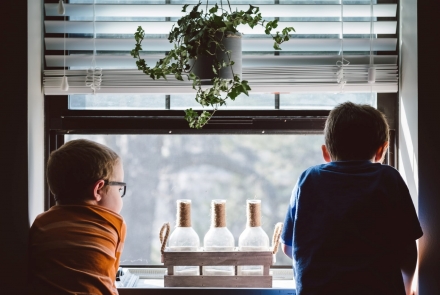
Photo by Andrew Seaman on Unsplash
We've got this: Reflections from a working mum
Holly Zervos
In late March, as I sat with my children in a Westfield Carpark (my husband bravely facing the toilet paper-starved Western Front), I asked Davey, my 4 year old son, ‘do you know why we have to wait in the car?’ He paused and then replied ‘coronavirus’. I was shocked. How much of my anxiety had he internalised? Is he absorbing, by some curious child-like osmosis, every single Chief Medical Officer update? Crap! Does he know who Brendan Murphy is? Jolted from my spiralling thoughts I responded, ‘yes Davey, that is absolutely correct. And why do we have to stay inside because of the coronavirus?’ His answer, straight out of the mouths of babes, ‘the bushfires, mummy’.
Although my reflection will not have the economic insights of a Quentin Grafton, and I dare not comment publicly on the environmental implications moving forward (I’ll leave that to Frank Jotzo), I can speak as a 33 year old mum trying to navigate the home, work and of course, COVID-19 terrain.
In a recent Crawford Podcast, Martyn Pearce interviewed Nicola Palfrey, Director of the ANU Australian Child and Adolescent Trauma, Loss, and Grief Network, about managing family communications in times of uncertainty. Ms Palfrey addressed the extreme difficulty (at this point) of shielding our children from information regarding the pandemic. She advised parents to ‘provide facts about what has happened and give them clear information about how to reduce their risk of being infected by the disease, in words that they can understand depending on their age’.
These sentiments, echoed by Public Health experts globally (such as Dr Archana Basu of the Department of Epidemiology, Harvard T.H. Chan School of Public Health), encourage parents to ‘keep their explanations simple and factual’. Dr Basu also emphasises the importance of ‘maintaining routines and consistency in caregivers and environments’ to provide a sense of security within our children.
Armed with this expert knowledge, and fed-up with take-away pizza, I was determined to have a typical pre-pandemic family meal. I donned my MasterChef apron and tossed (some panic-purchased) canned beans into a Zervos family favourite, burritos. Benny, my two year old, was not fooled. After a couple of bites, he turned to his brother and said ‘my Mexican has germs in it’. Terrific!?! Not only have my anxieties relocated to my children, now it’s in their food. I was clearly failing the ‘simple but factual’ brief.
For so many Canberrans, throughout this global crisis, parenting has been difficult, and the guilt (stemming from considerable privilege) has been palpable. This reflection, by its very nature, is privileged. I am employed. I have a roof over my head. I have food on my plate. My children are thriving and above all else, we have our health. As I hear incomprehensible daily death rates from Spain, Italy, UK and the USA, I ask myself, ‘why them and not me?’ Whilst I watch on helplessly as a beleaguered Navajo community is overwhelmed by COVID-19, I ask myself ‘why them and not me?’ And as I read reports of millions across the developing world struggling to obtain food and life essentials, I ask myself ‘why them and not me?’
In my attempt to navigate child psychology, Zoom-conferencing, remote-learning, home schooling and guilt-laden isolation, I wonder how the Zervos family can turn this crisis into some kind of meaningful positive, even if small.
The grim nature of COVID-19 has afforded us the gift of time. In the nineteenth century, naturalist and philosopher, Henry David Thoreau, embraced extreme social distancing. He spent over two years in self-imposed isolation in a cabin near Walden Pond, Massachusetts, and was able to affirm the principle of what can be attained when one pulls back to life’s essentials.
Famously he wrote:
‘I went to the woods because I wished to live deliberately, to front only the essential facts of life, and see if I could not learn what it had to teach, and not, when I came to die, discover that I had not lived. I did not wish to live what was not life, living is so dear; nor did I wish to practise resignation, unless it was quite necessary’.
Perhaps we are all learning to live a little more deliberately? For the Zervos family, the consequences of the pandemic have paved the way for a reprioritisation of sorts. It has led to a more meaningful connectedness that my family has not had for some time. Globally, however, it has turned the world upside down.
People usually forgotten have suddenly been recognised as the community’s heroes. The excesses of greed have disintegrated. Suddenly, we are celebrating the essential worker: cleaners; farmers; garbagemen; nurses; teachers; supermarket employees; Uber drivers and postmen. Lawyers, Hedge Fund bankers and Chief Executive Officers consigned to the margins.
In 1986, then UK Prime Minister, Margaret Thatcher, infamously said that ‘a man, beyond the age of 26, who finds himself on a bus can count himself as a failure’. It is one of the lessons of recent months that such individuals are in fact the cogs of a functioning, and even compassionate, society. Could it be the case that this well-founded admiration will also be internalised by our children? That our sons and daughters will want to be teachers, farmers or nurses- maybe even Jacinda Arderns?
Although at low points I found myself in aisle 6, bribing my children with chocolate if they let me put sanitiser on their hands, I am beginning to see the light at the end of a very bleak tunnel. Self-evidently, COVID-19 will drastically change the course that we are all on. I would like to think that it might also newly create a generation of engaged and empathetic citizens, parents, and dare I say it, public policy makers. If my kids can be an active part of this rejuvenated generation, then something extraordinary will have come out of this tragedy. That would be grasping opportunity, in the best sense of the word.
Updated: 13 July 2024/Responsible Officer: Crawford Engagement/Page Contact: CAP Web Team












